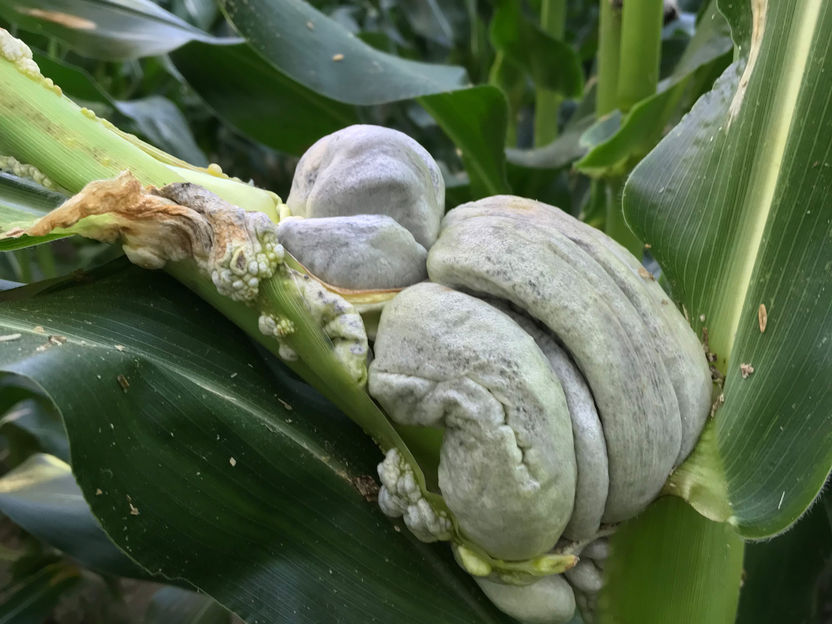Wheat Resistance Gene also Protects Corn and Barley against Fungal Disease
Advertisement
Plant researchers at the University of Zurich have developed transgenic corn and barley lines with improved resistance against several fungal diseases thanks to the wheat resistance gene Lr34. Following successful tests in the greenhouse, the researchers are now planning to carry out field trials at the Agroscope site in Zurich-Reckenholz.

Non-transgenic corn infested with corn smut in the field.
UZH
The group of Beat Keller, professor at the Department of Plant and Microbial Biology at the University of Zurich (UZH), has been researching the immune system of wheat varieties – with which the plant fends off pests and disease – for many years. Their goal is to better understand the complex interactions between plants and pathogens. At the same time, the more resilient lines can be used in plant breeding to help prevent large-scale loss of crop as a result of fungal diseases.
Field trials planned in Reckenholz
Hundreds of resistance genes that provide wheat varieties with protection against fungal pathogens are already known. One of these genes – the wheat resistance gene Lr34 identified by Keller and his team – is characterized by a long-lasting, partial effect against several fungal species. The UZH researchers want to find out whether this particular resistance gene also works when it comes to protecting corn and barley. Tests in the laboratory and in the greenhouse have shown that corn and barley lines genetically modified with Lr34 are indeed better protected against several fungal diseases. “We now want to verify the effect in the field and have submitted a request to the Federal Office for the Environment to carry out a field trial at the Agroscope site in Zurich-Reckenholz,” says Teresa Koller, who leads the planned field trials. They are planned from spring 2019 to autumn 2023.
Corn and barley with improved resistance against fungal disease
After the positive findings from the greenhouse trials, the researchers now want to test the protective effect outdoors: Lr34 corn plants against northern corn leaf blight (E. turcicum) and corn smut (U. maydis), and Lr34 barley plants against barley leaf rust (P. hordei) and powdery mildew (B. graminis f. sp. hordei). “We also want to investigate whether the genetic changes have an effect on other agronomic properties of the corn and barley lines, such as plant development and yield,” adds Koller.
Better understanding the immune system of plants
The Lr34 resistance gene has been extensively used for over a century in wheat breeding and cultivation. And yet, fungal pathogens have still not adapted to this resistance – in other words, Lr34 is as effective as ever. Many known resistance genes include a blueprint for receptors that enable the plants to recognize pathogens. The structure of Lr34 in contrast resembles what is known as an ABC transporter. These are membrane proteins that are responsible for transporting substrates across membranes to the inside of a plant cell or outside a cell.
Plants have developed a sophisticated immune system that allows them to distinguish between pathogenic microbes and those that are harmless or beneficial and then trigger the appropriate defense mechanism. “The main goal of the field trials is to improve our understanding of the function and effectiveness of Lr34,” says Teresa Koller, who already led the field trials with transgenic powdery mildew-resistant wheat lines from 2016 to 2018.

























































